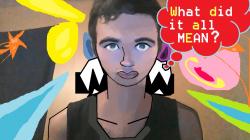Humans of Earth
I have decided recently that you can fairly judge someone by whatever it is they think they are responsible for.
For instance, a man, the lone survivor of a plane crash, emerges from the wreckage. He will have one of two thoughts: he will think that he is fortunate to have survived, or that he is not.
This is important, because it shows one of two schools of thought: the unfortunate man will blame himself for the events which have transpired, and will make it some kind of goal to live a life worthy of his fellow victims. Or he will succumb to the grief of it all.
The other school of thought belongs to the fortunate man: he will believe that it is not his fault that the plane has been downed, and that it is not his fault that he has survived. He is only relieved that he has made it out alive. The fortunate man will turn to God with praise, invariably, though perhaps it is more honest to say he will experience some sort of euphoric release.
The unfortunate man is factually wrong: he did not cause the swarm of birds to fly into the Number 3 engine, nor did he intend for the pilot to be suffer a massive heart attack at the moment the plane was out of control, nor did he arrange the series of random factors (the iron density in the seat in front of him, his slightly larger-than-average brain cavity that allowed for more dynamic cortex movement, etc.) that contributed to his salvation, but salvaged he is and now what?
The fortunate man is technically correct: he is innocent of any wrongdoing in the plane's malfunction and of the deaths of his fellow passengers.
But the fortunate man will never take responsibility for the lives which were lost around him: you see, to believe that you are fortunate to have survived a plane crash, you must believe you were meant to have survived the plane crash, which implies that there is meaning to your life, and logically from there, all life. What is that meaning? You decided long before you boarded the fateful flight. Someone else, or something else, is in charge, and that someone orchestrated life (perhaps God?) and has not only given it wings and heartbeats and blood, but imbued living with meaning. The important thing is this: someone else gave life meaning, and by that token, your life is saved to preserve that meaning.
The unfortunate man, however, even in succumbing to his emotions of grief and shock and rage, realizes that he must create meaning for his life, or at least, that there is no inherent meaning to his survival; that it is an accident, the same kind of accident which downed a plane. He will not believe himself to be part of a plan. He will see the lack of a plan clearly, in the moment the plane goes down, when the mother clutching her infant screams, when the flight attendants frantically draw their seatbelts around them, when the old man gazes calmly, but sadly, into the great twilit sky, he will know that there is no plan. And he will know, after he survives, that his survival was not meant to be, his survival is an outlier in an unforgiving universe, and he will seek until his last heartbeat to bring forgiveness into that universe the way a lifeguard will seek to bring breath into a drowned man's lips.
I think the important thing here to remember is this: do not trust a man who says he is of God, for such a man intends to return to God and there is no room in Heaven for the humans of earth.

Multiple Outcomes Possible
A woman could have survived. He heard a few men scream and clutch babies or kids as jet plummeted. I judge folks by their character, but I AM odd. Guilt shapes personality, behavior, future decisions, i.e., not gonna fly again. Survivor syndrome thoroughly covered here. Nice portraits: Healthy/Strong vs. Guilty/Tragic.
.
~A~
.
Fantastic
this is impressive and subsequently one of the best prose poems I’ve read in a while.
I am the fortunate man...
well...in my humble opinion.
if I had to chance a guess....I’d put my chips All In...
that you are one too.
Splendid.